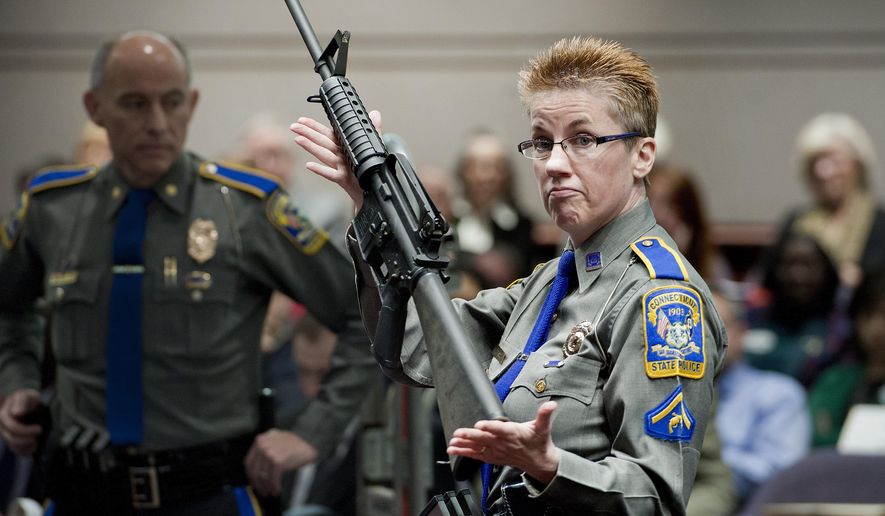The families of nine victims in the 2012 Sandy Hook Elementary School shooting secured a $73 million settlement Tuesday against Remington Arms, the gun manufacturer that marketed the rifle used in the deadly rampage.
The families’ attorneys hailed the move as a victory that allows others to sue gun-makers in the aftermath of mass shootings.
During the roughly seven-year court battle, the families alleged that Remington marketed its rifle as a “combat weapon” to young men prone to violence. The gun used in the attack was the Bushmaster XM15-E2S rifle, according to The Associated Press.
They accused the company of unfair trade practice for its advertisements under Connecticut law in their wrongful death lawsuit.
According to the families’ counsel, under the settlement, they can release company documents that allegedly show Remington’s wrongdoing — and the company’s insurers will pay them $73 million in damages.
“These nine families have shared a single goal from the very beginning: to do whatever they could to help prevent the next Sandy Hook. It is hard to imagine an outcome that better accomplishes that goal,” said Josh Koskoff, counsel at Koskoff, Koskoff & Bieder, representing the families.
“This victory should serve as a wake-up call not only to the gun industry, but also the insurance and banking companies that prop it up. For the gun industry, it’s time to stop recklessly marketing all guns to all people for all uses and instead ask how marketing can lower risk rather than court it. For the insurance and banking industries, it’s time to recognize the financial cost of underwriting companies that elevate profit by escalating risk. Our hope is that this victory will be the first boulder in the avalanche that forces that change,” Mr. Koskoff added.
A spokesperson from Remington did not immediately respond to a request for comment.
The families pointed to one of the company’s advertisements that showed the rifle with the phrase, “Consider Your Man Card Reissued,” according to the AP.
The gun company had argued that their marketing had nothing to do with the shooting and that federal law gave the gun industry immunity. But the Connecticut Supreme Court allowed the case to proceed under state law.
“Before we brought this case, gun-makers thought they could not be held accountable for mass shootings. This case shows they can be,” said Alinor Sterling, an attorney at Koskoff, Koskoff & Bieder. “It is already serving as a model for other gun cases across the country. When an industry can be held accountable for its behavior, that behavior becomes more responsible.”
Remington, founded in 1816, filed for bankruptcy for a second time in 2020.
The families filed their lawsuit in 2014 — two years after 20-year-old Adam Lanza used a Remington rifle that his mother owned to kill 20 children and six educators at the elementary school in Newtown, Connecticut. He also killed his mother and later took his own life.
Nicole Hockley, whose son Dylan was killed in the shooting, said that the company prioritized profit over her child’s safety.
“Marketing weapons of war directly to young people known to have a strong fascination with firearms is reckless and, as too many families know, deadly conduct. Using marketing to convey that a person is more powerful or more masculine by using a particular type or brand of firearm is deeply irresponsible,” she said.
Kenneth Abraham, a law professor at the University of Virginia, said it’s uncommon for settlements to include the release of company documents and for gun manufacturers to be held liable in situations like the Sandy Hook massacre.
“This is unusual. It may well provide a basis for suits against firearms manufacturers in similar situations in the future,” Mr. Abraham said.
Nora Freeman Engstrom, a law professor at Stanford University, said that while the multimillion-dollar settlement is notable, the fact that company information will be shared is important.
“Many scholars believe that the greatest benefit of public health litigation is the information such litigation can bring to light. Information is critical, as it can help regulators regulate, and it can steer consumers to safer, not shoddier, goods,” she said. “This litigation could end up being important, not just for the precedent it set but for the information it unearthed.”
But Timothy D. Lytton, a professor at Georgia State University College of Law, warned that lawsuits like this are still a long shot until the Supreme Court weighs in on the matter.
“This is not a floodgate story. This is a maintaining momentum story,” Mr. Lytton said, referring to lawyers who bring claims against gunmakers. “These lawsuits are still a long shot.”
• This story is based in part on wire service reports.
• Alex Swoyer can be reached at aswoyer@washingtontimes.com.




Please read our comment policy before commenting.